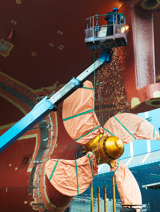Recent webinar held in collaboration with the National Safety Council, as part of its Work to Zero initiative.
Working at height is dangerous. Accidents related to falls from height are the largest cause of workplace fatalities after road accidents. Technology is changing that.
The National Safety Council (NSC), the main nonprofit safety advocate in the US, through its Work to Zero initiative in collaboration with Safetytech Accelerator, are piloting a program to help employers trial and adopt safety technology to save lives, in this case in the area of working at height.
Safetytech Accelerator, a non-profit organisation established by LR and the Lloyd's Register Foundation, focuses on safety and risks in industrial settings.
At a recent showcase of companies deploying technologies to minimise the risks of falling from height, Work to Zero’s director Emily Whitcomb, said, “We want to reduce the barriers for small and mid-sized companies to implement safety technologies.”
The six companies showcased were UK robotics company HausBots, drone makers Upteko from Denmark and Prenav from the US, Matroid, a US designer of computer vision detectors, US construction analytics provider Newmetrix and US video analytics company IronYun.
An audience poll showed that 77% of respondents felt that the companies’ technologies would help eliminate safety hazards at their workplaces.
HausBots, which builds wall-climbing robots to paint and maintain buildings. HausBots CEO and co-founder Jack Cornes said that the company’s robots can move and climb on all surfaces, in all directions. With a crafted chassis design, the robots, which can carry up to 6kg, have high-speed airflow and low pressure to generate downforce.
Cornes said: “Our purpose for existence is pretty simple—we think that in today’s day and age, having people at height, at danger, doing inspections and maintenance of critical assets in the exact same way we did a hundred years ago, is unacceptable. We want to stop human feet from leaving the floor in these inspection projects, using robots.”
HausBots was established in 2019 after one of the founders realised it was too dangerous to paint his parents’ house from a height. Today, with US$1m in funding from venture capitalists and government grants, the company has grown to eight robotics engineers.
Danish drone maker Upteko, was another of the featured companies. CEO Mads Jorgensen said that besides drones, Upteko develops software to control and navigate drones, as well as to analyse images the drones capture.
Upteko’s drones are used in maritime search and rescue operations, oil detection and the inspection of ships and offshore wind vessels. In search and rescue tasks, for example, the drones can fly out to pinpoint the location of someone who has fallen overboard. Once the person is located, the drone sends an image to guide the rescue vessel towards the subject.
Jorgensen said, “The drones that we’re custom building, are for the maritime environment, meaning they are water resistant and are able to withstand harsh weather conditions when they’re offshore. Basically, they’re more robust drones than you normally see.”
Dan Poots, Innovation Associate at Safetytech Accelerator, said the Accelerator wants to help companies to reduce the costs of improving workplace safety.
He said: “We work with clients to help them identify and prove where technology can solve their thorniest safety challenges. We also work with clients to see how safety technology can impact their ESG goals, bottom line and efficiency.”
Poots has cited the use of drones and artificial intelligence as an example of how technology eliminates safety risks.
He said, “If a robot is doing the work at height, a human doesn’t have to take that risk. AI can also identify dangerous scenarios.”









